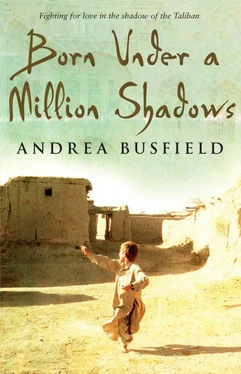“Fawad!” my mother cried, grabbing me by the arm and practically dragging me to the garden. “There’s someone I want you to meet.”
Obviously I’d not been involved in my mother’s first marriage, so I thought I was about to go through some kind of formal introduction to the man who would soon become my father. But it still seemed odd. After all, I’d been speaking to Shir Ahmad for the best part of the year, every day of it. In fact, without me they probably wouldn’t have been getting married.
I passed Georgie, James, and May, whose faces looked stupid with joy, and then the woman my mother had been close to when I first came into the yard got up from the ground to greet me. Close up I could see she was beautiful. She was also young, much younger than my mother, and, rather weirdly, she shared her green eyes.
“Fawad,” my mother said in a shivering voice, coming to a stop in front of the woman. “This—oh, son!—this is your sister, Mina.”
Well, if anyone ever needed further proof of God’s great love and compassion, he only had to look at the beautiful face of my lost sister. After so much darkness she came into our lives like sunshine, and it showed that even though God sometimes took away, he also gave back.
Although I was amazed and feeling brilliant at the sight of Mina, for a full hour I was knocked dumb. My heart was so swollen with happiness, no words could find a way past it to come out of my mouth. For months I’d been wondering whether my sister would hear Georgie’s message on the radio, and when she never turned up I began to accept that she was probably dead, along with the rest of our family. But now I knew that every day she’d been getting taller and more beautiful in a house in Kunar.
Apparently, Georgie had known about Mina for a full two weeks but hadn’t told anyone because she had been trying to arrange a way to get her to Kabul to surprise both my mother and me. Really, I had to congratulate her on that because there was no way on God’s earth I could have kept that secret to myself.
Now that she was here, nothing else seemed to matter, and over a never-ending chain of cups of tea that James and May were mainly in charge of producing, as my mother had some serious mothering to catch up on, we all listened in amazement as she told us what had happened to her after she’d been stolen by the Taliban. It sounded absolutely frightening and, even though I was still learning about life, I guessed she left out much of the story, because when she fell over her words or they stopped for a bit my mother would take her hand and pass on her strength to her.
Mina said that after being thrown into the truck with the rest of our village’s girls, she was taken west. In a gentle voice, she described how men with guns guarded them all through the journey so that they couldn’t escape. When one girl did jump off the back, having gone mental with fear, a Talib simply pointed his gun at her and shot her dead. “We were like sheep going to slaughter,” she said. “Nobody told us anything. We had no idea where we were going, and most of us assumed we would soon be killed… or worse than that.”
As Mina spoke, our mother bowed her head. I felt the water come to my eyes too. My sister waited for us to finish our sadness, and then kissed us before continuing.
For three whole days she and the friends she had known from the day she came into this world were trapped in the truck, forced to survive on scraps of bread and leftover food that was chucked into the back for them to eat whenever the Taliban stopped for a meal. Then at last, as they began to grow weak and sick and their clothes stank with their own dirt, they arrived in the province of Herat, where the men who had ripped them from the arms of their families dragged them from the back of the truck—beating the ones that were screaming into silence—and forced them to wash.
Once they were clean, the girls were taken to a room in a building in the middle of nowhere where they were made to stand in a line. Men began to arrive, to look at them and pinch their bodies. One by one the girls around Mina began to disappear, sold to men they didn’t know as new wives, or as future brides for their sons, or as slaves.
Mina awaited her turn, but when no man came to grab her by the arm and push her out the door she thought she might have escaped because she was so much smaller than the rest. But it turned out that she had been bought the very night she had been forced onto the back of the truck and driven away from Paghman.
“When almost all of my friends had gone, a man came in. He looked like a Talib with his long beard and turban, but he told me not to be afraid and he held out his hand.”
Unable to do anything else, Mina followed him.
The man took her to a nearby Toyota pickup and told her to jump in the back among the sacks of rice and beans and cans of cooking oil he was transporting. He then got into the front seat and started driving back along the road Mina and her friends had just come down. The farther they traveled, the more Mina dared to believe that the man might be taking her home, because he hadn’t once touched her or moved to beat her; he’d even given her a kebab after stopping at a tea shop. But then, instead of going straight toward Kabul, they started moving south. When they finally stopped, in front of a big house in a small dusty village, Mina was told she was in Ghazni.
Grabbing a sack of rice from the pickup, the man nodded his head for Mina to follow him into the house. Inside, an older woman was waiting with her children. When she looked at Mina her face immediately clouded, but she didn’t say anything. The man then left Mina with his children, some of whom were older than she was, and took his wife away into another room. About thirty minutes later both of them returned, and whatever the man had said to his wife she seemed to accept it. Though she was never friendly to Mina, she never beat her either. However, she did make her work, and for the next four years my sister practically had a twig brush glued to her hand.
“Considering what could have happened, it wasn’t too bad, and they were decent enough people. And though I was never happy in that house, after the first week I was never afraid in it either.”
Mina said the man who had bought her, for a price she had never been told, was called Abdur Rahim. His wife’s name was Hanifa. She was a strong woman and proud of her husband and her children. She ruled the house with the force of a king when her husband was away, which was quite a lot. During the first year she coped with Mina by treating her like “a stray dog”; she was fed and watered and given a corner of the kitchen to sleep in. She was also warned never to go upstairs into the family’s main living space—unless it was with a brush in her hand. Abdur Rahim’s children were quite nice to my sister. They would often come and talk with her, and even help her with her chores when she grew tired or ill. “They were a good family, so life was okay. It just wasn’t much of a life, that’s all.”
But then everything changed again.
One day, Abdur Rahim called Mina to his side and told her it was time for her to leave. He said he was sorry, and he looked genuinely upset. He then told her that he had made a promise to himself to protect her in some small way so that he could compensate her for the sadness he had visited on her life—it turned out that Abdur Rahim had been in our house the night the five Taliban knocked down our door. “He told me he had seen you, Mother, fighting so hard for all of your children, and then when he turned to walk away he had been trapped by the wide eyes of a small boy and he became consumed by guilt and shame. That must have been you, Fawad. Abdur Rahim told me that it was because of the look in your eyes, the complete fear and horror of the night mirrored in them, that he decided to buy me. He felt the dishonor of what they had all done that night hanging around his neck, and he needed to save me in order to save himself. And because of that his wife agreed to shelter me also.”
Читать дальше












